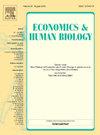Second generation effects of an experimental conditional cash transfer program on early childhood human capital in Nicaragua
IF 1.8
3区 医学
Q2 ECONOMICS
引用次数: 0
Abstract
Interventions targeting improvements in human capital are often motivated by their potential to break the intergenerational transmission of poverty from parents to children. This study contributes to the thin evidence base on these links by examining outcomes for children of former program beneficiaries of a conditional cash transfer (CCT) program, capitalizing on randomized variation in the timing and CCT’s impact on maternal human capital. We estimate intent-to-treat (ITT) differential effects on early childhood anthropometric and cognitive outcomes for 0–3-year-old children of program beneficiaries [N=366], as well as effects on key domains including nutrition, health, stimulation and the home environment. We find that moderately higher schooling for mothers (19–22 years old) who were the original program beneficiaries did not translate into improvements in anthropometrics or cognitive outcomes for their children. We also find no effects on behaviors commonly thought to be affected by higher education such as investments in nutrition and preventive health, or stimulation. Early program beneficiary mothers, however, had worse mental health outcomes and were more likely to use violent disciplinary practices such as spanking, threatening and punishing. Findings demonstrate the complexity of intergenerational mechanisms across genetic, biological, environmental and behavioral factors, and also suggest the importance of maternal mental health as a mechanism influencing child outcomes.
尼加拉瓜有条件现金转移实验计划对幼儿人力资本的第二代影响
以改善人力资本为目标的干预措施的动机往往是它们有可能打破贫穷从父母到子女的代际传递。本研究利用有条件现金转移支付(CCT)项目实施时间的随机变化和CCT对母亲人力资本的影响,考察了前项目受益人的子女的结果,从而为这些联系提供了薄弱的证据基础。我们估计了意向治疗(ITT)对项目受益人0 - 3岁儿童早期人体测量和认知结果的差异影响[N=366],以及对营养、健康、刺激和家庭环境等关键领域的影响。我们发现,作为最初项目受益人的母亲(19-22岁)接受中等程度的高等教育并没有转化为其子女在人体测量学或认知结果方面的改善。我们还发现,通常认为受高等教育影响的行为,如营养、预防健康或刺激方面的投资,没有受到影响。然而,早期受益计划的母亲的心理健康状况较差,更有可能使用暴力惩戒措施,如打屁股、威胁和惩罚。研究结果表明,遗传、生物、环境和行为因素的代际机制是复杂的,也表明母亲心理健康作为影响儿童结局的一种机制的重要性。
本文章由计算机程序翻译,如有差异,请以英文原文为准。
求助全文
约1分钟内获得全文
求助全文
来源期刊

Economics & Human Biology
医学-公共卫生、环境卫生与职业卫生
CiteScore
4.50
自引率
12.00%
发文量
85
审稿时长
61 days
期刊介绍:
Economics and Human Biology is devoted to the exploration of the effect of socio-economic processes on human beings as biological organisms. Research covered in this (quarterly) interdisciplinary journal is not bound by temporal or geographic limitations.
 求助内容:
求助内容: 应助结果提醒方式:
应助结果提醒方式:


